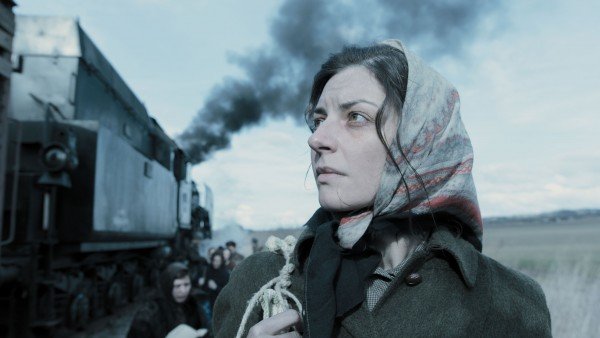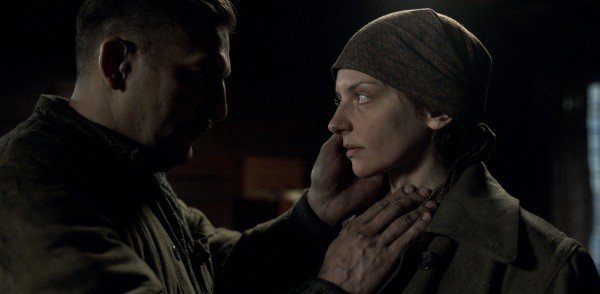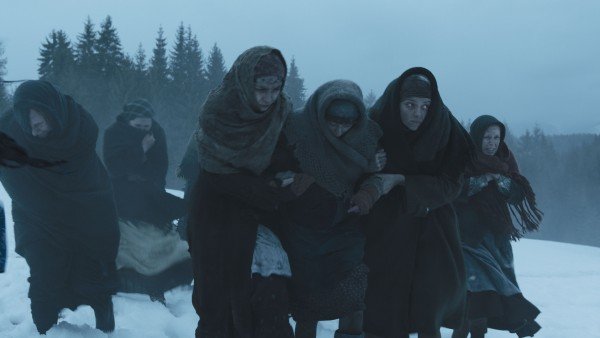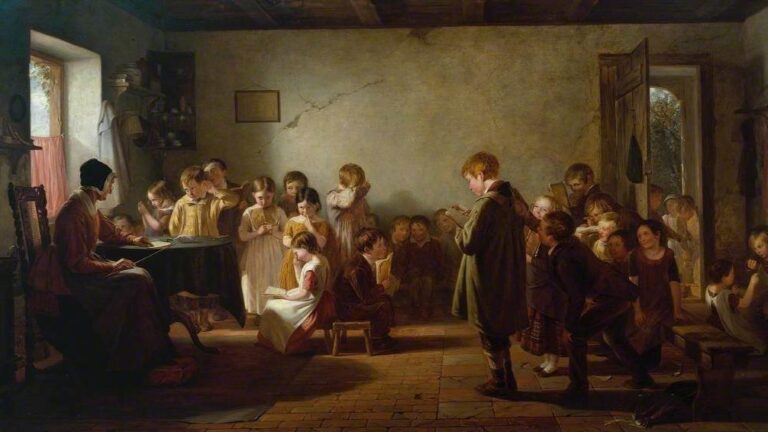In the last days of the Second World War, there was an event in Hungary that was kept secret for decades. When Hungary fell to the Soviet army, hundreds of thousands of Hungarians of German descent, mostly Swabians, were deported east to work in forced labor camps to power the Soviet economy. Many of them never returned from what was known as the Gulag. The knowledge of this act of retribution for Nazi terror, against innocents who had no connection to the Nazis, was suppressed for decades under pain of further deportation if the returning victims spoke. Swabian men, women, and children, made to work in mines, road construction and forest clearing, suffered immensely. Despite the horror and trauma resulting from this tragedy, there were also moments in the life of the prisoners that were filled with rapture. There were some sublime reunions between not fully understood by spectators of history. Such is the case in the 2018 Hungarian film Eternal Winter, directed by Attila Szász, based on a screenplay by Norbert Köbli, a powerful drama film about the tragic fate of the Swabians in Hungary under the Soviet occupation.
The film begins during the 1944 Christmas season. Irén is a young Swabian woman, magnificently portrayed by Marina Gera, living with her father, a Lutheran pastor, her mother and her and young daughter. At the outset of the film, we learn that Irén’s husband, a conscripted soldier, has not returned from the front line in the Soviet Union; despite Irén’s assurances, her child doubts she will see her father again. Several days later, Irén herself is taken by the Soviets.

During the train journey, Irén befriends a deaf adolescent girl named Anna (portrayed by Laura Döbrösi) and becomes a sort of surrogate mother to her. Upon arrival, the commander informs the women of their culpability of crimes against Russia due to their German heritage. As a punishment, they must labor until the war’s conclusion.
Irén and Anna toil under excruciating workloads and are always on the brink of starvation.
Despite Irén’s almost superhuman efforts to keep her alive, Anna dies from typhus. Devastated by the loss of her only companion, Irén loses her temper when she is provoked by a guard and is locked in solitary confinement. While in delirium, Irén dreams of a portal in her cell that leads to her attic back home. She wakes just as she exits this attic and before she sees her daughter again. Irén is returned to the main prison as a changed woman, one determined to forget her past and survive.
Now resolved to concentrate on her own survival for the sake of her family waiting for her at home, Irén submits to the advances of Rajmund, a fellow prisoner. They live as a couple for several years, with little hope of ever returning home. They learn about the end of the war, but their release does not seem to be on the table. In fact, many of those who had been taken to the Soviet Union as forced laborers and survived returned years after the end of WWII. Unexpectedly, four years after they were taken prisoners, it is announced that Stalin has decided to let them go.

They have a choice of either returning to Hungary or, due to their heritage, defecting to East Germany, with a greater possibility of immigrating to the West. Rajmund and Irén decide to go to East Germany together. Just before leaving, Irén changes her mind. She leaves Rajmund a farewell letter and returns to Hungary, to be reunited with her family.
Irén greatly suffers throughout the film. She loses her freedom, her health, her virtue, and finally, her hope. The one thing she doesn’t lose is her faith, and the love for her daughter. Her dream in which she sees her daughter again while descending through her attic proves to be prophetic: the attic functions as a bridge between Irén’s living nightmare and her dream, which becomes reality.
What made the trauma of those deported to Siberia from Hungary was that it was hushed up and the world learned of the crimes against the Swabians only much later. At least 100,000 of those Hungarian civilians who were taken to labor camps never returned.
As the film implies, the Communist Soviets applied the principle of collective guilt to whole nations and nationalities, which meant that all Swabians were regarded as responsible for the atrocities committed by the Nazis. In reality, the Swabian community had lived in Hungary for hundreds of years and had no connection with Nazism. As the prison commander suggests at one point in the film, there were Swabians Hungarians, called Volkdeutsche by the occupying Germans, who supported the Nazi cause due to a shared German heritage, as evidenced by Swabian Hungarian military units who supported the Nazi war effort. But most Swabians, like Irén and her family, simply wanted to be left alone and tend to their families.
To make matters worse, the Hungarian Communists who came to power with the help of the occupying Russians
also blamed Hungary’s ethnic Germans for the war and thus large swaths of the Swabians were expelled
to Germany as part of the widespread practice euphemistically call ‘population transfers’. Between 1946 and 1949, by the authority of decree No. 12/330, the majority of Swabians were expelled from Hungary. Today, the Hungarian government remembers this injustice, promoting the memory of the imprisoned and lost Swabians.
The inhuman prison conditions are portrayed in graphic detail (such as starving women being stripped naked, multiple episodes of beatings by guards). Irén reaches a point between sanity and insanity, being fully aware of the vileness of her situation, but her vision of the descent from the attics instils hope in her. While brutal pain and acts of violence are depicted in Eternal Winter, as is the resulting trauma and confusion represented in fever dreams, yet there is the most sublime ending of all, a mother’s love finally realized upon seeing her daughter.
The private reunions that survivors had with their families upon return, that clandestine rapture which survived the deepest cruelty, attests to the undefeatable, enduring love of families and nation that survives.
Read more on the victims of communism:








